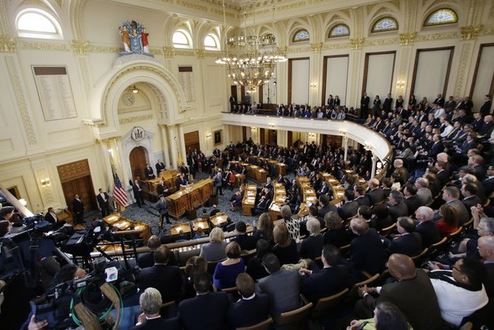TRENTON, NEW JERSEY — Lawmakers in the New Jersey state Assembly approved a proposal late last week to establish a task force to examine state services and support offered to residents that are deaf and hard of hearing. The measure had been previously approved by the state Senate this summer and will now need the governor’s signature to become law.
According to the New Jersey Department of Human Services (DHS), there are approximately 1 million living in the state with some form of hearing loss. DHS oversees programs and services for people with hearing loss, such as employment support, access to free hearing aids and other resources for individuals and families.
Reviewing Impact of Hearing Loss
According to supporters of the bill, there should be a full accounting of those services that exist and what other services may still be needed. “We need to get a better handle on what we can be doing as a state to aid those who suffer from hearing impairments,” said Egan Jones, one of the bill’s sponsors.
Annette Quijano
“Hearing impairment can have a profound impact on one’s life, whether it’s genetic, medically induced or trauma (related). These numbers are only expected to increase, along with the need for services, as individuals reach senior citizen status. As a state, we need to find ways to assist those who suffer from hearing impairments, regardless of the cause.” –Annette Quijano (D-Union), bill co-sponsor
The proposal calls for the establishment of a 14-member panel, known as the “New Jersey Hearing Impairment Task Force.” The group would consist of commissioners from DHS, Department of Banking and Insurance, Department of Education, and the director of the DHS division that directly oversees these programs.
In addition to the commissioners, the task force would also include three public members appointed by the Senate president, with recommendations from relevant advocacy groups, one of whom must have a hearing impairment. The speaker of the state Assembly would be responsible for selecting three participants, including the parent of a child diagnosed with hearing issues, and clinical hearing specialists with expertise in pediatrics and geriatric care. The governor would then select four public members, with choices based on input from relevant academic and professional groups.
A 12 Month Process
According to the bill, the task force panel would be required to look at the effectiveness of existing health insurance mandates; access to medical testing; availability of hearing aids and other assistive technology; availability and effectiveness of rehabilitation programs; and benefits provided by the current educational policies related to identifying, evaluating, and supporting students with hearing impairment.
The work of the task force would need to start within six months, and would then have another six months to complete its report, and include “a summary of findings and recommendations for legal and programmatic changes”. These report findings would then be submitted to the governor and Legislature for review.
Source: NJ Spotlight







